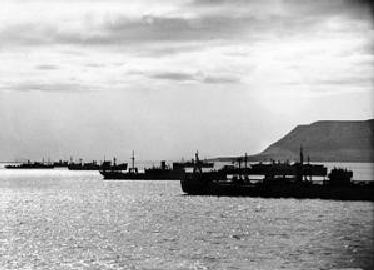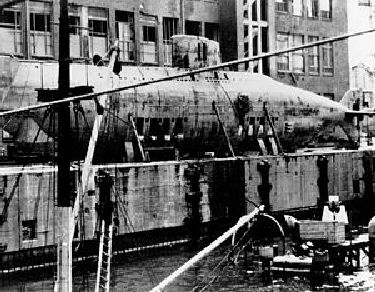
Merchant Ships Assembling for Convoy - World War II (Wikipedia)
Yet those events, the surprise Japanese attack on our naval base in Hawaii, followed almost immediately by declarations of war with the Axis powers, were but the culmination of a series of occurrences which amounted to an undeclared war, ongoing since 1940 or even earlier.
In March, 1941, a few months after the German campaign against France had ended, in June, 1940, and after the inspiring (to Americans) Battle of Britain, the first major conflict of World War II won by the Allies, thus giving hope that Britain could in fact stand up to Germany, Congress passed the Lend-Lease Act, authorizing President Franklin D. Roosevelt to loan and sell and then ship to Britain and her allies material support which could thwart further Nazi German aggression. In so doing, however, the government gave up this country's neutrality. We continued to call ourselves non-combatants, and Roosevelt had even been promising voters he would keep us out of the war, but in fact the fighting and dying among our citizens had already begun.
 Merchant Ships Assembling for Convoy - World War II (Wikipedia) |
In 1940, military attacks on U.S. merchant shipping had resulted in 7 ships being sunk. In 1941, many more were destroyed by German air or submarine actions. Before Pearl Harbor, between 200 and 300 merchant mariners or their armed guards had died through such attacks.
In fact, the U.S. Merchant Marine was the unsung hero service of the Second World War, accounting for a higher percentage of members being killed even than the Marines, with the other services (Army, Navy, Coast Guard) suffering even fewer casualties on a percentage basis.
Japan had invaded Manchuria and then China itself prior to the commencement of European hostilities. In Nanking, China, alone estimates of the dead at the hands of the Japanese between 1937 and 1938 were around 300,000. Later, Germany's battle with France seems also to have further emboldened her ally, Japan, which promptly invaded northern Indochina. In reaction to that and Japan's previous aggressions, the U. S. imposed on Japan an embargo of scrap metal shipments, which Japan had needed for her war effort. This was followed shortly too by a freezing of Japanese assets in the U.S. and a boycott on the sale and shipment of oil from our nation to Japan. At the time, the Land of the Rising Sun was dependent on this country for 80% of its oil imports, so our action in depriving them of vitally needed commodities while shipping materials to Britain, then her primary enemy in the Far East, was considered hardly the behavior of a neutral nation.
A year later, in June, 1941, Japan was seeking by invasion to supplement its supplies of oil, rubber, etc., and smashed into southern Indochina. The U.S. responded again, this time by cutting off all trade with Japan. Her leaders felt they must have greater shipping. If not with the U.S., they determined to acquire it via the additional countries they were planning to invade. The main hindrance to this appeared to be our vulnerable naval force at Pearl Harbor.
Meanwhile, the German U-boat campaign against Canadian, American, or British shipping was severe enough that Roosevelt felt decisive action was required. Neutral or not, efforts needed to be made to curtail the mauling the convoys were getting. He sent Britain 50 of our World War I destroyers to help escort the ships. In addition, noting that the Germans had begun infiltrating Greenland, using it for radioing weather station info to the Kriegsmarine, and fearing German submarine bases there, he ordered its occupation. His order was carried out in April, 1941. This was followed for similar reasons, in July, 1941, 70 years ago, with an occupation of Iceland, taking over the "protection" of that island's population (at the time rather sympathetic to Germany) from Britain, freeing up the latter country's forces for more immediate conflict with Germany.
 German Submarine Used in World War II (Wikipedia) |
After Germany had invaded the U.S.S.R., in June, 1941, the terms of the Lend-Lease Act were extended to include Russia as well and our supplies would prove to be vital in the Soviet Union's several years' resistance to German aggression. From such a beginning, before war had been declared between the U.S.A. and Germany, assistance by the West to Stalin's people would ultimately help lead, after huge sacrifice, to their complete victory over German forces on the eastern front.
Was U.S. involvement in World War II inevitable? Did it only come about because our pure neutrality seemed over time to come at too high a cost, as one after another of the weaker nations fell to Axis powers? Was it the result of a strategy by FDR, who sought a means to overcome isolationist sentiment and found it in not letting on that he knew in advance of the attack on Pearl Harbor? Such issues may be debated by historians for yet many more decades.
I personally think we could not have avoided that war but that the delay of an official entrance into the conflict, though we were too weak at first to have dealt with the likes of Germany and Japan, gave this nation time to become a vast arsenal and fighting force which would reap huge post-war rewards of her success at a time when, due to their earlier and more devastating engagement in the conflict, few if any other countries had the capacity to compete. I, for one, am glad things worked out as they did, for both very personal as well as patriotic reasons.
Nonetheless, it is arguable that the war did not truly begin for us on December 7, 1941, but a year or two prior to that, when we clearly began taking sides and suffering casualties, and that from then on it was no longer an issue of if but of when we would make that official, hopefully at a time to give us the maximum ultimate advantage.